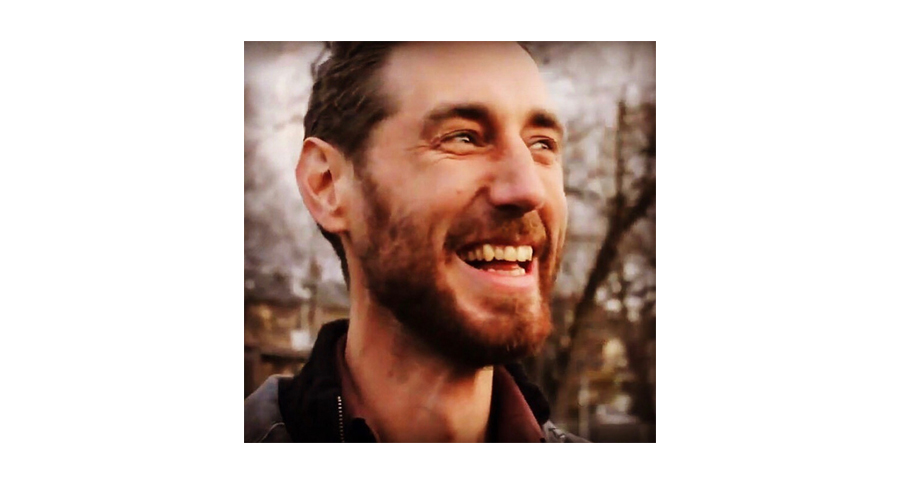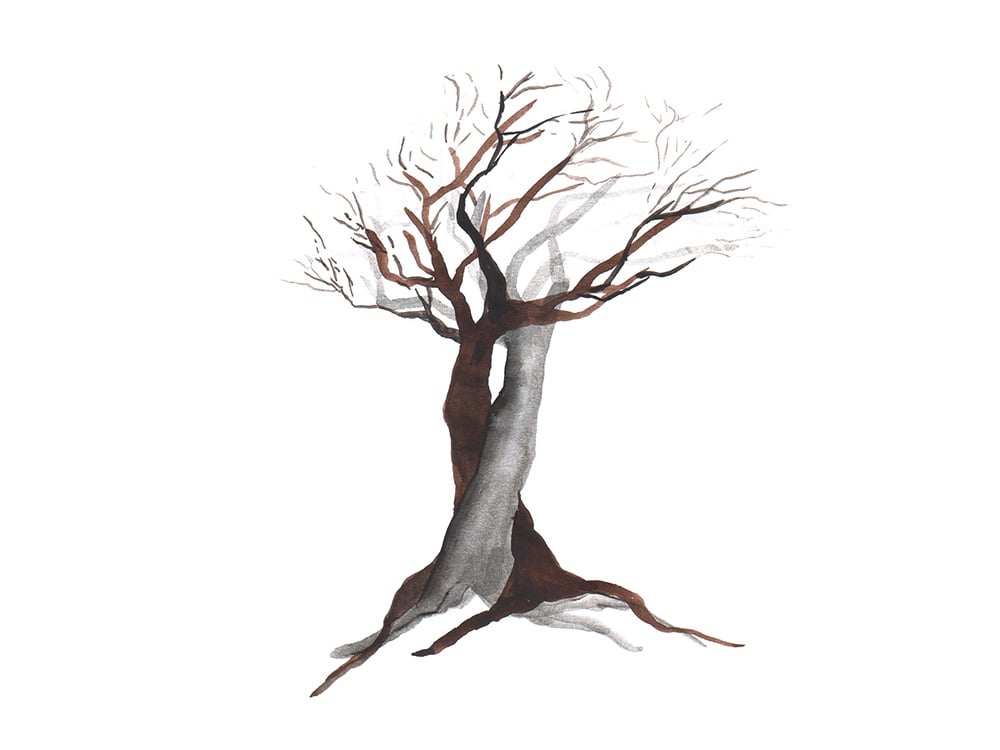“Mama, look! There’s something stuck to our front door!”
My three-year-old daughter bounds up the stairs and grabs the notice. She hands it to me proudly, a smile on her face. I look at it curiously. It’s a notification that a package is waiting for me at the post office nearby.
I am weary. I have been weary for months. My head is spinning most of the time. My heart alternates between being clenched shut and broken open, spilling out for everyone to see. So far, I have made it through one season since the love of my life, Brian, my little girl’s Dada, died. It was cancer and it was quick. How many more seasons do I have to endure now without him?
It’s helpful to have something concrete to focus on. And so we head back out toward the post office to collect our mysterious package.
I open it up on the bustling sidewalk, the warm sun shining down on me. It’s a beautiful cookbook and a long letter, written in familiar handwriting that I once knew well. Katie was my childhood and high school best friend, but as adults we lost touch.
I devour her letter as I push my daughter’s stroller down the street and tears stream down my face. She extends an offer of friendship and love once again, after all these years. She recounts the one time she met Brian and the tangible love she could feel between us. But it is the comment at the end of her note that hits me to my core:
“Mira, your writing about grief is so powerful. Your words come from a place of pain and yet your authenticity provides proof somehow, that the world really is filled with love. Thank you for helping us understand grief. Your words are needed.”
When Brian got sick, my world crashed down around me. Overnight I became a full-time caregiver and advocate for the rapidly dying, beautiful man I had built a life with. I did this while also trying to understand and process immense pain and keep my own body functioning. I did this while trying to still be a mother.

I’d met Brian seven years prior, and our connection was instantaneous. Meeting him felt like the world was finally opening up. Brian saw me for who I truly was and fully accepted me without any expectation that I would provide or fulfill. He knew the deepest and darkest parts of me, and still he loved me. We grew around each other like two tree trunks, holding each other up, anchoring each other down.
The night we found out that Brian had cancer, after he’d fallen asleep, I paced the house. My heart was racing, my breathing haggard. Then I instinctively reached for my old journal. I hadn’t written anything in years, but I started writing that night.
The cancer was in his brain, his bones and multiple organs. It was everywhere. I wrote every single day after that.
Just a few days after his diagnosis, I wrote: “What happens when your greatest fear becomes your reality? So much. Initially, shock and sheer terror. Hysterics. Crying. Numbness. No appetite. Panic attacks in the middle of the night. Deep, loving conversations with your sick lover. Very hard conversations with your parents. Tears. So many tears. Fear. Painful, deep, core fear. Fear unlike any you’ve had before. Processing and being together. No outside influences. No doctors yet. No answers. A weekend of starting real pain meds. Of noting other people’s fear. Then, a trip to the ER. All night being asked the same fucking questions. Yes, we know he has cancer everywhere. We have an appointment with the oncologist on Monday. Just drain this fluid from his abdomen so that he can breathe and we can go home. Hearing Bri’s pain in the middle of the night and being unable to do anything. The heaviness of it.”
And I wrote: “I am going to get us all through this.”
When I read these words now, I barely remember writing any of it. But I am so grateful that I did.
As Brian faded away, I sat on the edge of his bed and I sobbed and I wrote and I spoke to him and I touched him and I wrote some more.
After Brian died, the writing continued to pour out of me. I wrote his obituary in one sitting at our dining room table, 15 minutes top to bottom.
I wrote about the night we first locked eyes across a busy dance floor. As Brian always said, with a twinkle in his eye, “It was love at first sight.” I wrote about the open, deep love he brought into my universe and the way he filled my life with a newfound appreciation for the simple things, which he made magical. I wrote of how he lived his life authentically, connecting easily with strangers and leaving a strong impression on everyone he met. I wrote about his sweet smile and his gentle laugh.
The words flowed from my heart straight onto the page. No filter. No editing. I wrote and delivered his eulogy the same way.
I initially started sharing my writing about grief publicly because I felt invisible. I knew no one who had endured what I had. I felt a catharsis through writing. I found a sort of momentary inner peace by taking my overwhelming thoughts, feelings, pain and love and creating something cohesive and whole. A piece of art that could define my loss; a tangible expression of something that felt too massive and elusive otherwise.
I avoided, and continue to avoid, scrolling on social media. As a 35-year-old woman, photos of babies and lovers abound on my Instagram feed — others’ happy images that trigger my own grief. And yet, at the same time, I started using Instagram as one of the most powerful tools for my own grief process.
I wrote about the love Brian and I shared. About him. No one seemed to want to talk about him with me face-to-face. And at first, I didn’t want to talk to many people face-to-face anyways. And so, I wrote:
“Your body melted before my eyes, so quickly we had no time for so many things. I am learning how to carry you with lightness, sometimes. And other times I am heavy with my grief. You don’t want that, I know. I feel the push and pull of this world and yours. Thank you for leaving us with so much lightness, grace and dignity. The clinging and holding on is all me.”
I wrote every day. In notes on my phone, in texts to myself, on post-it notes:
“Everything around me looks like items from another person’s life. ‘She looks like she had a pretty good life,’ I think. ‘It seems like she was happy.' I am not the me who I knew before. I am getting to know myself again.”
I shared my darkness and my light:
“Our existence here is fleeting. Youth and strength, goodness and love; none of it makes a difference when death comes to call. Plans will not save you. Death can come out of nowhere when you’re about to make a baby or call back a friend. Go out and love. What are you waiting for?”
I realized very early on that distraction wouldn’t work for me. The only way back into the light was straight through the darkness. The only way forward was to learn to embrace the pain alongside the love.
Shockingly, there have been magical changes alongside the tragedy, chaos and instability. Processing and diving into the pain and trauma of losing Brian’s physical presence has broken something open within me, and I am finally able to authentically be myself. Suddenly, my drive to write and to share supersedes my fear of judgment and this feels absolutely freeing. I have already lost the most important part of my life. What could I possibly be scared of now?
There’s something about the immediacy of sharing that feels powerful and true. It is honest and open, unfiltered and unedited. I have a public Instagram account, and other widows and grievers follow and comment on what I write. We share our loneliness and our darkness. We share the hurtful things that are said to us in passing by those who have not been touched by life-changing grief. We share our small victories and our big transformations. With a loss as isolating as this one, a community of sisters and brothers around the world who understand is the greatest gift. Sharing also gives my family and friends the opportunity to read my words and the chance to learn about grief and start getting to know me again.
Prior to Brian’s illness and death, I considered myself a good friend. Someone who was able to sit with others and really listen to their problems. But after Brian died, I found that I felt angry, lost my ability to pay attention and became indescribably tired the minute anyone else started talking about their own challenges. I grieved the loss of my own identity as a good friend. Writing has allowed me to feel of service once again.
There are, of course, pitfalls to sharing one’s grief so publicly. When you share your grief and vulnerability openly, you become a lighthouse for others experiencing all kinds of unprocessed grief. You must learn to manage the onslaught of messages that follow. You will receive messages that show you have been judged in a way that you feel is inaccurate. And you must manage all of this at a time when you are feeling more vulnerable than you ever imagined possible.
And yet, despite these challenges, I continue to write, and I continue to share. A few months back, an essay I wrote was published in the Globe and Mail. Yesterday my daughter came across the newspaper on the floor of my office.
“Mama, why does it say Mira Simone Etlin-Stein in the newspaper? That’s your name!”
I explained that a story I wrote had been published. I told her that I was writing about Dada and about her and me and our love and our sadness. I told her that there are people who want to learn about our experience. That it has value.
Her eyes got wider and wider as I spoke. Suddenly, she smiled.
“Mama, you are a writer! And you are writing about Dada. Probably Dada is helping you be a writer.”
I often feel most connected to Brian when I write. I often hear his voice in my head when I write. In the end, writing connects me to myself, to my own intuition, and to the universe. Writing is helping me pick up the pieces of my shattered soul and slowly put them back together again.
Mira Simone Etlin-Stein’s grief writing can be found on instagram @newmoonmira. ![]()
Read more: Health
















Tyee Commenting Guidelines
Comments that violate guidelines risk being deleted, and violations may result in a temporary or permanent user ban. Maintain the spirit of good conversation to stay in the discussion.
*Please note The Tyee is not a forum for spreading misinformation about COVID-19, denying its existence or minimizing its risk to public health.
Do:
Do not: